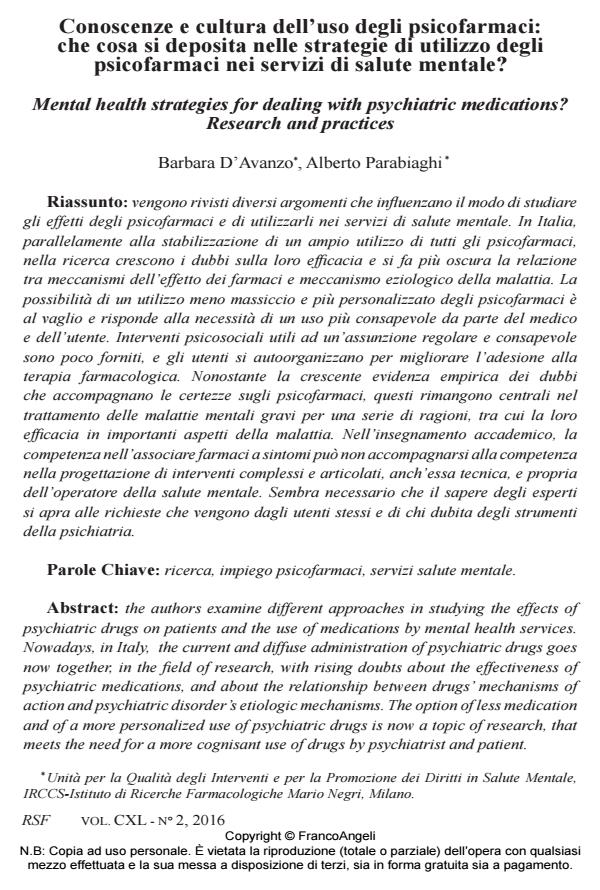Mental health strategies for dealing with psychiatric medications? Research and practices
Journal title RIVISTA SPERIMENTALE DI FRENIATRIA
Author/s Barbara D'Avanzo, Alberto Parabiaghi
Publishing Year 2016 Issue 2016/2
Language Italian Pages 14 P. 9-22 File size 224 KB
DOI 10.3280/RSF2016-002002
DOI is like a bar code for intellectual property: to have more infomation
click here
Below, you can see the article first page
If you want to buy this article in PDF format, you can do it, following the instructions to buy download credits

FrancoAngeli is member of Publishers International Linking Association, Inc (PILA), a not-for-profit association which run the CrossRef service enabling links to and from online scholarly content.
The authors examine different approaches in studying the effects of psychiatric drugs on patients and the use of medications by mental health services. Nowadays, in Italy, the current and diffuse administration of psychiatric drugs goes now together, in the field of research, with rising doubts about the effectiveness of psychiatric medications, and about the relationship between drugs’ mechanisms of action and psychiatric disorder’s etiologic mechanisms. The option of less medication and of a more personalized use of psychiatric drugs is now a topic of research, that meets the need for a more cognisant use of drugs by psychiatrist and patient. Psychosocial interventions for improving self-management and drug non-adherence are seldom offered by mental health services. Users thus self organise themselves to improve medication non-adherence. Despite growing empirical evidence on the doubts about the effects of psychiatric drugs, medications remain critical for treating severe mental illnesses, for a number of reasons, including drug effectiveness on major aspects of psychiatric disorders. Academic teaching focuses on the competence in associating drugs with symptoms, and might not include the expertise in designing complex and integrated treatment plans, an essential competence mental health professionals should acquire. The authors finally suggest that researchers and mental health professionals should take account of psychiatric users’ requests and also of the doubts about traditional psychiatric tools.
Keywords: Research, use of psychiatric drugs, mental health services
Barbara D'Avanzo, Alberto Parabiaghi, Conoscenze e cultura dell’uso degli psicofarmaci: che cosa si deposita nelle strategie di utilizzo degli psicofarmaci nei servizi di salute mentale? in "RIVISTA SPERIMENTALE DI FRENIATRIA" 2/2016, pp 9-22, DOI: 10.3280/RSF2016-002002